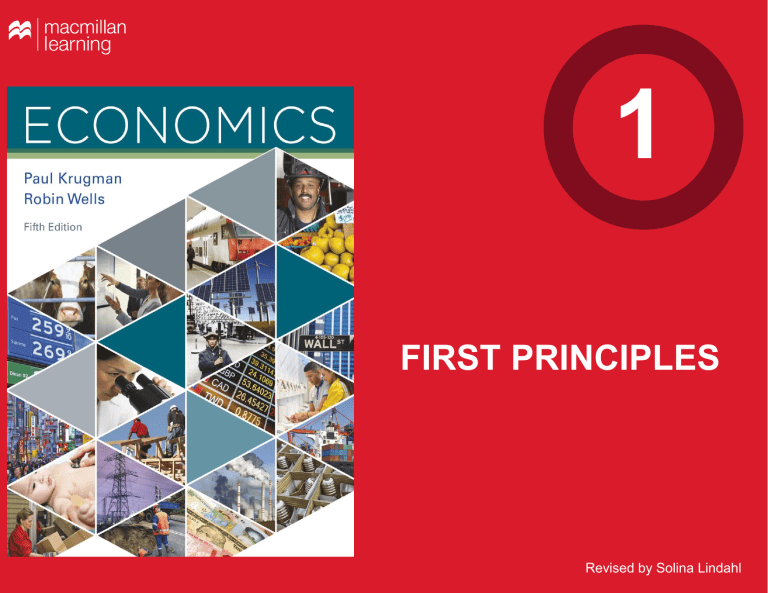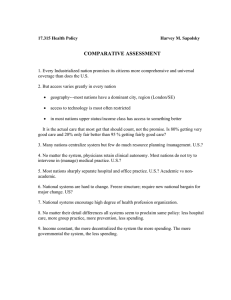
1 FIRST PRINCIPLES Revised by Solina Lindahl WHAT YOU WILL LEARN IN THIS CHAPTER • What four principles guide the choices made by individuals? • What five principles govern how individual choices interact? • What three principles illustrate economy-wide interactions? INDIVIDUAL CHOICE: THE PRINCIPLES PART 1 1. Choices are necessary because resources are scarce. Resource: anything that can be used to produce something else. Scarce: in short supply; a resource is scarce when there is not enough of the resource available to satisfy all the various ways a society wants to use it. INDIVIDUAL CHOICE: THE PRINCIPLES: PART 2 2. The true cost of something is its opportunity cost. Opportunity cost: what you must give up in order to get something. Mark Zuckerberg understood the concept of opportunity cost – and dropped out of Harvard INDIVIDUAL CHOICE: THE PRINCIPLES: PART 3 3. “How much” is a decision at the margin. Trade-off: comparison of the costs and the benefits of doing something. INDIVIDUAL CHOICE: THE PRINCIPLES: PART 4 • Marginal decision: decision made at the margin of an activity about whether to do a bit more or a bit less of that activity. • Marginal analysis: the study of marginal decisions. • Incentive: anything that offers rewards to people who change their behavior. INDIVIDUAL CHOICE: THE PRINCIPLES: PART 5 4. People usually respond to incentives, exploiting opportunities to make themselves better off. In the United States, restaurant customers have the option of adding a tip to the restaurant bill. In much of Europe a tip is added automatically. Where would you expect waiters to be more attentive? INTERACTION AND INDIVIDUAL CHOICE: PART 1 5. There are gains from trade. Trade allows us all to consume more than we otherwise could. INTERACTION AND INDIVIDUAL CHOICE: PART 2 6. Markets move toward equilibrium. Equilibrium: an economic situation in which no individual would be better off doing something different. Specialization: the situation in which each person specializes in the task that he or she is good at performing. INTERACTION AND INDIVIDUAL CHOICE: PART 3 7. Resources should be used efficiently to achieve society’s goals. Efficient: taking all opportunities to make some people better off without making other people worse off. INTERACTION AND INDIVIDUAL CHOICE: PART 4 • Equity: a condition in which everyone gets his or her “fair share.” (There are many definitions of equity.) • EQUITY AND EFFICIENCY ARE OFTEN AT ODDS. INTERACTION AND INDIVIDUAL CHOICE: PART 5 8. Markets usually lead to efficiency. People normally take opportunities for mutual gain. 9. When markets don’t achieve efficiency, government intervention can improve society’s welfare. Sometimes markets fail and need correction. ECONOMY-WIDE INTERACTIONS • • • • • One person’s spending is another person’s income During recessions, a drop in business spending leads to: Less income, less spending… …and further drops in business spending, layoffs, and rising unemployment. ECONOMY WIDE INTERACTIONS: PART 2 11. Overall spending sometimes gets out of line with the economy’s productive capacity. ECONOMY WIDE INTERACTIONS: PART 3 12. Government policies can change spending. The U.S. government funded the Works Progress Administration and provided almost 8 million jobs between 1935 and 1943.


